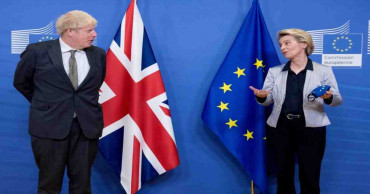Brexit
Five years on, Brexit’s full impact still unfolding
On 31 January 2020, at 11 p.m. London time—midnight in Brussels—the UK officially left the bloc following nearly five decades of membership that had enabled free trade and movement between Britain and 27 other European nations, reports AP.
For Brexit supporters, this was the moment the UK reclaimed its sovereignty. For opponents, it signified a nation diminished and isolated.
South Carolina set for 3rd execution since September
Undoubtedly, the country was deeply divided, having taken a step into the unknown. Five years later, individuals and businesses continue to grapple with the economic, social, and cultural repercussions.
“The impact has been quite profound,” said political scientist Anand Menon, who leads the think tank UK in a Changing Europe. “It has reshaped our economy.
“And our politics has been fundamentally altered as well,” he continued. “A new division surrounding Brexit has become embedded in electoral politics.”
A Nation Divided by Its Decision
As an island nation with a strong sense of historical significance, Britain had always had a complex relationship with the EU. The 2016 referendum on whether to remain or leave came after decades of deindustrialisation, years of public spending cuts, and high immigration—circumstances that allowed the pro-Brexit argument to thrive, promising the UK would ‘take back control’ of its borders, laws, and economy.
Yet the result—52% voting to leave and 48% to remain—came as a shock to many. Neither the Conservative government, which had campaigned to stay, nor pro-Brexit campaigners had prepared for the complexities of the separation.
The aftermath of the referendum saw years of tense negotiations over the terms of the split, with a divided UK and an embattled EU locked in prolonged disputes. The deadlock in Parliament ultimately brought down Prime Minister Theresa May, who was succeeded in 2019 by Boris Johnson, vowing to “get Brexit done.”
However, the reality was far from straightforward.
A Blow to the UK Economy
The UK left without an agreement on its future economic relationship with the EU, which had accounted for half its trade. What followed was 11 months of contentious negotiations, culminating in a last-minute trade deal on Christmas Eve 2020.
While the agreement ensured goods could move without tariffs or quotas, it introduced new bureaucracy, costs, and delays for businesses.
“It has cost us money. We are definitely slower and it’s more expensive. But we’ve survived,” said Lars Andersen, whose London-based company, My Nametags, ships children’s clothing labels to over 150 countries.
To continue trading with the EU, Andersen had to establish a base in Ireland, through which all EU-bound orders must pass before reaching customers. While he considers the effort worthwhile, he notes that some small businesses have ceased EU trade altogether or relocated manufacturing outside the UK.
Julianne Ponan, CEO of allergen-free food company Creative Nature, saw her growing export business to the EU collapse post-Brexit. Since then, she has successfully pivoted to markets in the Middle East and Australia, a shift she views as a positive outcome of leaving the EU.
Now that she has navigated the bureaucratic hurdles, she is cautiously rebuilding business ties with Europe.
“But we’ve lost four years of growth there,” she admitted. “And that’s the sad part. We would be much further along if Brexit hadn’t happened.”
Some hospitals pause gender-affirming care to evaluate Trump's executive order
According to the UK government’s Office for Budget Responsibility, long-term UK exports and imports are expected to be approximately 15% lower than if the country had remained in the EU, with economic productivity reduced by 4%.
Brexit advocates argue that this short-term economic strain will be outweighed by Britain’s ability to forge its own global trade deals. Since leaving the EU, the UK has signed agreements with Australia, New Zealand, and Canada.
However, trade expert David Henig of the European Centre for International Political Economy suggests these deals have not compensated for the decline in trade with Europe.
“The big players haven’t suffered as much,” Henig explained. “We still have Airbus, we still have Scotch whisky. We still do defence and pharmaceuticals. But mid-sized businesses are struggling to maintain their export position. And new firms aren’t entering the market.”
Unintended Consequences
In many ways, Brexit has unfolded differently from what both supporters and critics anticipated. The COVID-19 pandemic and Russia’s invasion of Ukraine added further economic turmoil, making it difficult to isolate Brexit’s precise impact.
One key area where expectations have not been met is immigration. A major motivation for many Leave voters was a desire to reduce immigration. Yet, post-Brexit, immigration has surged, as the UK has granted significantly more work visas to individuals from outside Europe.
Meanwhile, the return of protectionist political figures, particularly U.S. President Donald Trump, has placed Britain in a precarious position—caught between Europe and its long-standing ‘special relationship’ with the United States.
“The world is a far less forgiving place now than it was in 2016 when we voted to leave,” noted Menon.
Can Britain and the EU Rebuild Their Relationship?
Public sentiment towards Brexit appears to have shifted, with polls indicating a majority now view the decision as a mistake. However, the prospect of rejoining the EU remains remote. With divisions still fresh, few are eager to reopen the debate.
Labour Prime Minister Keir Starmer, elected in July 2024, has pledged to improve relations with the EU but has ruled out re-entering the customs union or single market. His approach focuses on incremental changes, such as easing restrictions for touring artists and recognising professional qualifications, alongside deeper cooperation on security and law enforcement.
While EU leaders have welcomed the change in tone, their focus remains on internal challenges, with the UK no longer a priority.
“I completely understand—it’s difficult to rebuild trust after such a tough divorce,” said Andersen. Nonetheless, he remains hopeful that the UK and EU will gradually move closer again.
“I suspect it will happen,” he said. “But it will be slow and subtle—without politicians making a big fuss about it.”
1 year ago
Australia says it’s reached a free trade deal with Britain
Britain and Australia had agreed on a free trade deal that will be released later Tuesday, Australian Trade Minister Dan Tehan said.
The agreement is the first for Britain since it left the European Union.
British Prime Minister Boris Johnson and his Australian counterpart Scott Morrison had reached agreement on the deal during negotiations in London, Tehan said.
Read:Odds of settling US-EU trade rifts? Hope may outrun progress
“Both prime ministers have held a positive meeting in London overnight and have resolved outstanding issues in relation to the FTA,” Tehan said in a statement, referring to the Free Trade Agreement.
“Their agreement is a win for jobs, businesses, free trade and highlights what two liberal democracies can achieve while working together,” Tehan added.
Both prime ministers would make a formal announcement on Tuesday morning in London and release further information, he said.
Tehan said he spoke to Morrison on Tuesday. Australian Agriculture Minister David Littleproud described the deal as a “in-principle agreement.”
Read:OPEC to boost oil output as economies recover, prices rise
“The details are being nutted out from the in-principle agreement that our two prime ministers were able to get to last night over dinner,” Littleproud told Australian Broadcasting Corp.
“Our departments and the Trade Department are working through feverishly to make sure that an announcement can be made at our time tonight so that Australians will see exactly what is in that in-principle agreement,” he added.
The agreement is Australia’s 15th free trade agreement.
RMIT University international business expert Gabriele Suder said the deal was good news for both Britain and Australia.
Read:Australian court upholds ban on most international travel
“It’s wonderful news for the U.K. ... in particular because this is the first post-Brexit deal that has been really constructed from scratch, negotiated from scratch, and in addition has been negotiated in a record time of just one year, which is very, very unusual for free trade agreement negotiations,” Suder said.
Britain is Australia’s fifth-largest trading partner. Suder said she expected the deal would add 1.3 billion Australian dollars ($1 billion) a year to the Australian economy.
4 years ago
EU tightens vaccine export rules, creates post-Brexit outcry
The European Union introduced tighter rules Friday on exports of COVID-19 vaccines that could hit shipments to nations like the United Kingdom, deepening a dispute with London over scarce supplies of potentially lifesaving shots.
5 years ago
EU avoided chaos, explored new paths in turbulent 2020 year
Between the specter of Brexit, the coronavirus pandemic and a new leadership team facing a budget battle, the European Union looked set to remember 2020 as an “annus horribilis.”
5 years ago
Britain ends long Brexit journey with economic break from EU
Britain’s long and sometimes acrimonious divorce from the European Union ended Thursday with an economic split that leaves the EU smaller and the U.K. freer but more isolated in a turbulent world.
5 years ago
EXPLAINER: Brexit ends Britons' right to live and work in EU
So far, the large majority of British and EU citizens have not felt the realities of Brexit. Though the U.K. left the European Union on Jan. 31, it follows the bloc’s rules until the end of this year as part of a transition period to the new economic relationship.
5 years ago
Timeline of events in Britain's exit from the European Union
A timeline of key events related to Britain’s decision to leave the European Union:
5 years ago
UK and EU reach post-Brexit trade agreement
Just a week before the deadline, Britain and the European Union struck a free-trade deal Thursday that should avert economic chaos on New Year's and bring a measure of certainty for businesses after years of Brexit turmoil.
5 years ago
EU-UK trade talks floundering over fish as cutoff day nears
Deep into a crucial weekend of negotiations, a breakthrough on fishing rights remained elusive for the European Union and Britain, leaving both without a trade agreement that would dull the edge of a chaotic, costly economic break on New Year’s Day.
5 years ago
Brexit trade talks with EU in ‘serious situation’: Boris Johnson
British Prime Minister Boris Johnson has underlined the post-Brexit trade negotiations between Britain and the European Union (EU) were now "in a serious situation," a Downing Street spokesperson said Thursday.
5 years ago



.jpg)

.jpg)


.jpg)




